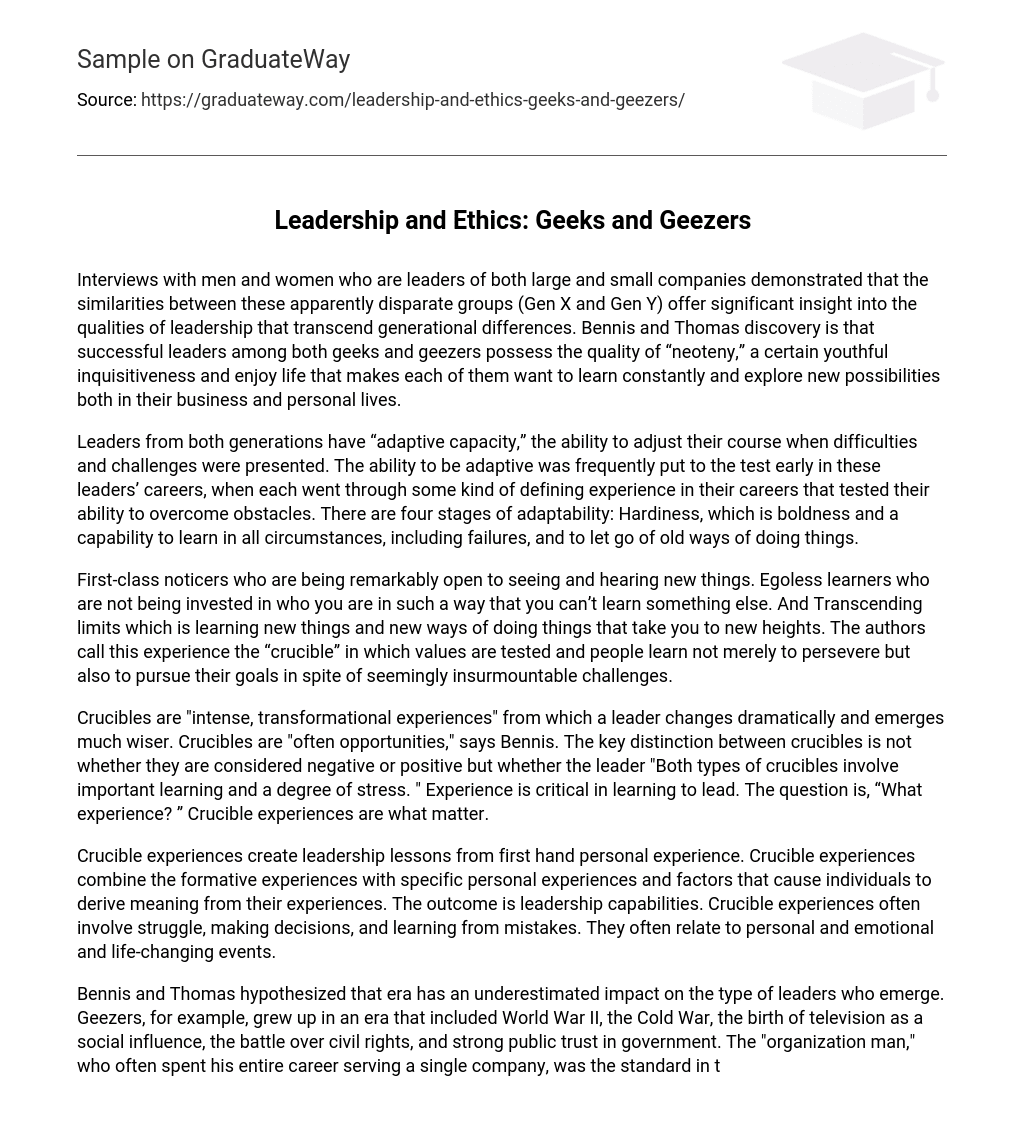Interviews with leaders of large and small companies, regardless of their generation, showed that there are commonalities between Gen X and Gen Y individuals in terms of leadership qualities. According to Bennis and Thomas, successful leaders from different generations share the characteristic of “neoteny,” which refers to an inquisitive and youthful mindset that drives them to continuously learn and explore new opportunities in both their professional and personal lives.
Both leaders from different generations possess “adaptive capacity,” which is their capability to adjust their approach in the face of difficulties and challenges. Their adaptability was frequently tested early in their careers through defining experiences that challenged their ability to overcome obstacles. Adaptability consists of four stages: Hardiness, characterized by boldness and the ability to learn from all situations, including failures, and to let go of outdated methods.
First-class noticers who are receptive to new experiences, egoless learners who are open to learning from others, and individuals who transcend boundaries by embracing new ideas and approaches. The authors refer to this transformative process as the “crucible,” where individuals test their values and develop the ability to persevere and strive towards their goals, even when faced with seemingly insurmountable hurdles.
Crucibles are powerful experiences in which a leader undergoes dramatic change and gains invaluable wisdom. Bennis emphasizes that crucibles are frequently opportunities, regardless of whether they are perceived as positive or negative. The crucial factor is that both types involve significant learning and a certain level of stress. Developing leadership skills heavily relies on experience. Therefore, the pivotal question is, “What kind of experience?” Crucible experiences are the ones that truly count.
Crucible experiences result in leadership lessons, derived from firsthand personal experiences. These experiences integrate formative events with individualized factors, enabling individuals to derive meaning and develop leadership capabilities. Crucible experiences typically entail struggles, decision-making, and learning from mistakes. They frequently revolve around personal, emotional, and transformative events.
Bennis and Thomas posited that the era in which leaders come of age has a greater impact than is commonly recognized on the type of leaders they become. For instance, individuals from the baby boomer generation, known as “Geezers,” were shaped by a time period that witnessed significant events such as World War II, the Cold War, the rise of television as a societal force, the struggle for civil rights, and a strong sense of trust in government. In their formative years, these leaders observed and absorbed the prevailing model of an “organization man,” who dedicated their entire careers to a single company. Moreover, the lasting effects of the Great Depression instilled anxiety and economic fragility in workers born around 1925.
In the “Era of Limits” (1945 – 1954), leaders adopted a command-and-control style similar to military structures. This style was familiar to many employees and fostered a strict work ethic and a strong desire for stability. It also led to widespread acceptance of having only one career throughout their lives. People from this generation typically had one to three jobs in their careers, considering work as an integral part of their social identity. They didn’t fully understand the value of diversity until later in their professional lives, believing that “paying your dues” was crucial. Their learning methods mainly involved traditional activities like reading and classroom education.
Geeks, who grew up in the “Era of Options” (1991-2000) that was marked by MTV, AIDS, terrorism, globalization, the end of the Cold War, weapons of mass destruction, high public distrust of government, and influential special interest groups, are more familiar with the challenges faced by two-career families. During this period, the traditional organization man disappeared as faster competition and innovation led to more flexible organizational structures. The rise of dot-com companies, largely influenced by the Internet, played a significant role in this transformation. Geeks prioritize creating a fulfilling life rather than solely focusing on making a living.
View team-building, engagement, and partnerships as indispensable for leadership and acknowledge the potential for fresh perspectives, ideas, and insights that arise from diversity. Possess a desire and belief in their ability to make a positive impact on the world. Display a willingness to take risks and embrace entrepreneurial endeavors, showing less loyalty to employers. Seek knowledge through both conventional and experiential methods. Exhibit comfort in situations of uncertainty and adaptability to change. Embrace the concept of multiple careers, attributed, in part, to increased life expectancy. Recently, I had the opportunity to interview my former Chef, Franck Deletrain (47 years old), which yielded numerous intriguing discoveries.
One observation I made from Bennis and Thomas’ book is that leaders, like anyone else, can feel overwhelmed at times. However, it is their ability to address challenges and have faith in themselves that enables them to overcome this feeling. Additionally, I noticed that Chef Deletrain’s success stems from his love for cooking and his commitment to performing tasks accurately, all while upholding the values of the company he is employed by.
The significance of having strong beliefs and passion in attaining success is exemplified by individuals such as Ned Regan and Wendy Kopp. Irrespective of age or personal interests, leaders are ordinary people who have attained higher levels of accomplishment through their experience, knowledge, and the determination that propels them towards success.
This was a positive experience because I believe that anyone who has the right qualities and knowledge while acting in the best interests of the organization can achieve great things. Moreover, Geeks and Geezers provided me with insight into the challenges faced by different leaders, enabling them to develop unique skills and abilities that ultimately contribute to their success in both professional and personal aspects.





